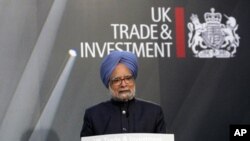India has put on hold a multi-billion dollar expansion of an aluminum plant by a British-based company. The government said it based its decision on environmental concerns. The government will also decide next week on the fate of a proposed steel plant by a South Korean company.
Environmental concerns
British-based Vedanta Resources had planned a six-fold expansion of its aluminum refinery in the eastern Orissa state. But the environment ministry asked the company to halt any further construction activity because of what it called "illegal work" to expand the plant. The government did not elaborate on what illegalities prompted its decision.
It is the second time that the company's mining projects in India met with a problem. Two months ago, the environment ministry rejected a proposal by Vedanta to mine bauxite for its refineries in Orissa saying it would damage the environment and displace tribal communities.
Another high profile project facing an uncertain future over environmental concerns is a proposed $12 billion steel plant by South Korean steelmaker Posco. The project, also to be established in Orissa, is the largest ever investment by a foreign company in India.
Recommendations
Three out of four members of a government panel have recommended scrapping clearances given to the project citing serious lapses. The panel had reviewed Posco's compliance with environmental laws, as well as its rehabilitation provisions for local people. The Environment Ministry is scheduled to take a decision on the fate of the project next week.
The deal for Posco's steel plant was first signed in 2005. But the project has already faced years of delays because of opposition from farmers unwilling to give up their land.
Chief economic adviser to the Federation of Indian Chambers of Commerce and Industry, Anjan Roy, says the fate of these projects is being carefully watched by foreign investors.
"If some projects are not being cleared, or projects which are cleared are being revoked, naturally there will be (a) nervousness among foreign investors," Roy said.
Government stand
The Environment Minister, Jairam Ramesh, has said he is not opposed to development or large projects, but is simply trying to ensure better compliance with environmental laws, which have often been flouted in the past.
Most of India's mineral resources are concentrated in eastern states. These are also some of the country's poorest regions, where development has lagged behind other regions.
Those in favor of the large mining and industrial projects say they will give a thrust to the industrialization of these areas and create new jobs. But farmers and tribal communities complain they get displaced from their land, and are unable to find alternate livelihood.




